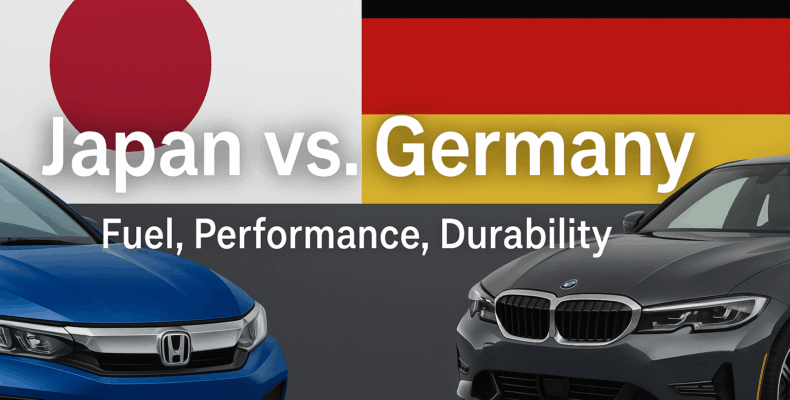Both Japan and Germany are renowned for producing world-class vehicles. However, when it comes to choosing between Japanese and German cars, buyers often weigh key factors such as fuel efficiency, performance, and durability. In this article, we compare the two automotive giants to help international buyers make informed decisions.
1. Fuel Efficiency
Japan: Focused on Economy
Japanese automakers like Toyota, Honda, and Suzuki prioritize fuel efficiency, especially in compact cars and hybrids. As a result, models like the Toyota Prius, Honda Fit, and Suzuki Swift offer outstanding miles-per-gallon (MPG) ratings.
-
Advanced hybrid technology (Toyota Hybrid Synergy Drive)
-
Smaller engine sizes with optimized combustion
-
Lightweight materials for reduced fuel consumption
Germany: Power Comes First
German brands such as BMW, Audi, and Mercedes-Benz typically emphasize performance, which often results in higher fuel consumption. While diesel engines are more common and efficient in Europe, they don’t always match the fuel economy of Japanese hybrids.
-
Turbocharged engines offer strong power but moderate efficiency
-
Diesel technology is more refined, but EV/hybrid adoption is slower than Japan
Conclusion:
If fuel economy is a top priority, Japanese vehicles generally outperform German ones, especially in urban or hybrid categories.
2. Performance
Germany: Precision and Power
German cars are known for their performance engineering, particularly in high-speed driving and luxury handling. Vehicles like the BMW 3 Series, Audi A4, and Porsche 911 excel in acceleration, cornering, and highway cruising.
-
Rear-wheel and all-wheel drive systems
-
Superior suspension tuning
-
Strong torque and horsepower output
Japan: Practical and Reliable
Japanese cars tend to prioritize balance over power. While they may not dominate in top speed or 0–100 km/h acceleration, they offer reliable, consistent performance in daily driving.
-
Smooth automatic CVT transmissions
-
Dependable engines for long-term use
-
Sporty models like the Nissan GT-R or Toyota GR86 still deliver excitement
Conclusion:
German cars win in high-performance categories, but Japanese cars lead in practical, daily-use performance.
3. Durability and Maintenance
Japan: Built to Last
Japanese cars are famous for long-term durability and low maintenance needs. Many vehicles from Toyota, Honda, and Subaru regularly exceed 200,000 km with minimal issues.
-
Easy-to-service engine layouts
-
Fewer electronic components in older models
-
Widely available and affordable parts
Germany: High Quality, Higher Cost
While German cars use high-quality materials and advanced engineering, they may require more specialized maintenance. Complex electronics and parts often lead to higher service costs.
-
Premium parts = higher replacement costs
-
Maintenance intervals can be shorter (especially for performance models)
Conclusion:
Japanese vehicles are more durable and cost-effective to maintain in the long run, especially outside of Europe where German parts may be harder to source.
Trusted Exporters of Japanese Used Vehicles
If you’re interested in importing a fuel-efficient, durable Japanese vehicle, working with a reliable exporter is essential. Below are some of the most trusted exporters from Japan:
-
EVERY Co., Ltd.
Headquartered in Niigata, EVERY has shipped used cars, trucks, and machinery to over 100 countries since 2006. They are known for honest listings and fast support.
➤ https://www.everycar.jp/ -
SBT Co. Ltd.
Offers a large inventory of inspected vehicles with strong logistics capabilities. -
Be Forward
Popular worldwide with a massive vehicle database and customer support in multiple languages. -
Qualitex Trading
Known for competitive prices and well-maintained Japanese cars. -
Autorec Enterprise Ltd.
A long-established exporter focused on quality control and reliable shipping.
➤ Read more here:
Top Recommended Japanese Used Car Export Companies for International Customers
Final Thoughts
Both Japan and Germany produce excellent vehicles, but the right choice depends on your priorities.
-
Fuel efficiency & durability? Go Japanese.
-
Luxury & performance? Go German.
Either way, understanding the strengths of each country’s engineering will help you buy smarter—especially when importing used vehicles from Japan.
